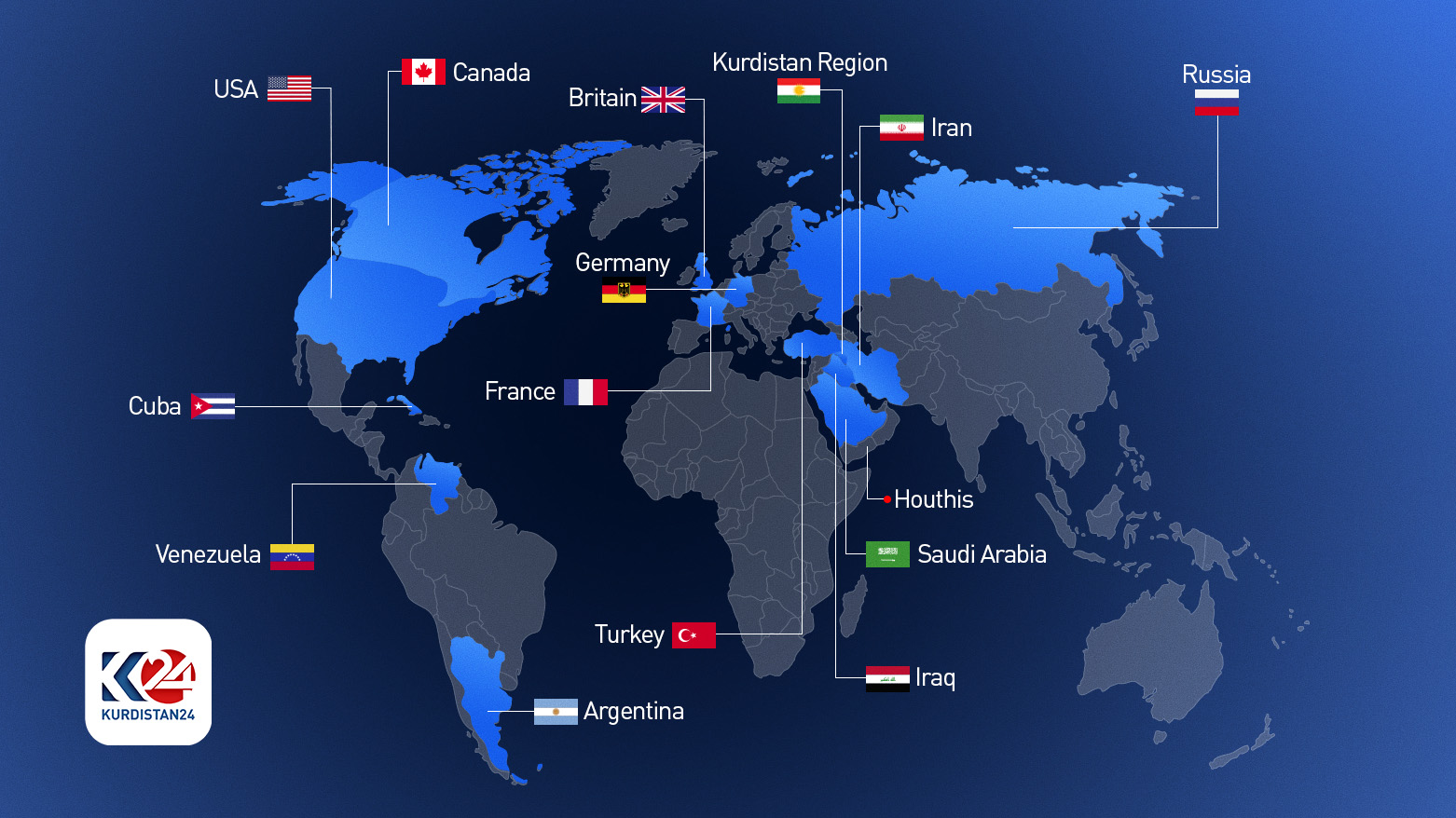Global reaction to killing of Nasrallah, fear of escalation in Middle East
US President Joe Biden described the event as “a measure of justice,” while Iran issued stern warnings to Israel, suggesting grave consequences for the region.

ERBIL (Kurdistan24) – The world faces heightened tensions following the death of Hezbollah’s long-time leader, Hassan Nasrallah, who was killed in an Israeli airstrike on a Beirut suburb.
The killing of the Iran-backed militia leader has ignited concerns about a full-scale war in the Middle East.
Read More: Hezbollah confirms death of Hassan Nasrallah in Israeli airstrike
US President Joe Biden described the event as “a measure of justice,” while Iran issued stern warnings to Israel, suggesting grave consequences for the region.
The Kurdistan Region’s Reaction
The Kurdistan Region’s Presidency issued a statement on Sunday expressing deep concern over the rapid military developments and escalating tensions in the Middle East.
Read More: Kurdistan Region's Presidency expresses concern over Middle East escalation, calls for restraint
The statement highlighted the region's alarm over the recent targeting of Sayyed Hassan Nasrallah, Secretary General of Hezbollah, and his companions, extending condolences to their families.
The Presidency warned that the current situation poses a grave threat to the security and stability of the region. It further cautioned that the continuation of such escalations will inevitably lead to more tragedies and widespread destruction.
In its call for peace, the Kurdistan Region’s Presidency urged all parties involved to exercise wisdom and self-restraint in order to prevent further deterioration of the situation and to safeguard stability in the Middle East.
US and Western Responses
President Biden characterized Nasrallah’s death as justice for the victims of Hezbollah’s terrorism, including "thousands of Americans, Israelis, and Lebanese civilians." He reiterated support for Israel’s right to self-defense, pledging to enhance US defense operations in the region.
Vice President Kamala Harris echoed Biden’s sentiments, labeling Nasrallah as a terrorist with American blood on his hands, while urging continued backing for Israel.
Leading Republicans also welcomed the news, celebrating the end of Nasrallah’s "reign of bloodshed, oppression, and terror."
Russia’s Response
Russia condemned Israel’s actions, with its Foreign Ministry decrying the "political murder" and urging Israel to cease military action in Lebanon. Moscow warned that Israel would "bear full responsibility" for the consequences of Nasrallah’s killing.
European Reactions
In Germany, Foreign Minister Annalena Baerbock warned that the assassination could destabilize Lebanon, which she noted was not in Israel’s best security interests.
Canada’s Prime Minister Justin Trudeau acknowledged Nasrallah’s role as the leader of a terrorist organization but called for restraint to protect civilians in the unfolding conflict.
Britain's Foreign Secretary David Lammy urged an immediate ceasefire, stating that diplomacy was the only path to lasting peace and stability for both Lebanon and Israel.
In France, Foreign Minister Jean-Noel Barrot called for an immediate halt to Israeli strikes in Lebanon, opposing any ground operations. France urged Hezbollah and Iran to avoid actions that could further escalate regional tensions.
United Nations and Palestinian Reactions
UN Secretary-General Antonio Guterres expressed grave concern over the rapid escalation in Beirut.
Meanwhile, Hamas, the Palestinian militant group, condemned Nasrallah’s killing as a “cowardly terrorist act,” denouncing the Israeli strike as barbaric. Palestinian President Mahmud Abbas offered condolences to Lebanon for the loss of Nasrallah and the civilians killed in the Israeli offensive.
Regional and International Responses
Iran’s Reaction
Iran’s First Vice President, Mohammad Reza Aref, cautioned Israel, declaring that Nasrallah's death would "bring about their destruction," as quoted by Iran's ISNA news agency.
Meanwhile, Iran’s Foreign Ministry affirmed that Nasrallah’s mission would persist after his death, with spokesman Nasser Kanani stating that the leader’s "sacred goal" of liberating Jerusalem would be realized. Supreme Leader Ayatollah Ali Khamenei declared five days of public mourning in Nasrallah’s honor.
Read More: Iran’s Supreme Leader Khamenei reaffirms support for Hezbollah amid Israeli airstrikes
Iraq's Prime Minister Mohammed Shia al-Sudani condemned the killing and issued a statement, calling the Israeli strikes on south Beirut a "shameful attack".
The Iran-backed Houthi rebels in Yemen vowed that Nasrallah’s death would fuel further resistance against Israel, intensifying the ongoing conflict in the region.
Turkey’s President Recep Tayyip Erdogan described the situation in Lebanon as genocide, though he refrained from directly addressing Nasrallah’s death.
In Cuba, President Miguel Diaz-Canel condemned the assassination as a cowardly act, placing the blame squarely on Israel and the United States.
Argentina’s President Javier Milei supported Israel’s actions, stating that the world was now "a little freer" after the elimination of a dangerous terrorist.
Saudi Arabia’s Foreign Minister Faisal bin Farhan Al Saud warned the UN of the negative repercussions the incident could have on the entire region, urging restraint to avoid further conflict.
Finally, Venezuelan President Nicolas Maduro expressed solidarity with Lebanon and denounced the killing as a criminal act that took the lives of many innocent people.
As global powers react, the assassination of Hassan Nasrallah threatens to plunge the already volatile Middle East into further chaos. Leaders around the world are calling for calm and diplomacy to prevent a wider war from erupting in the region.
Updated: 15:06